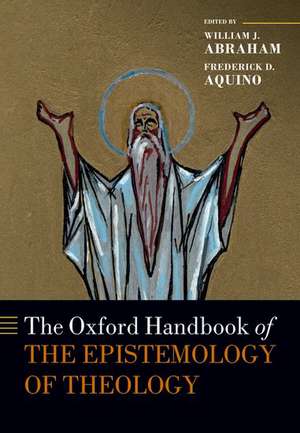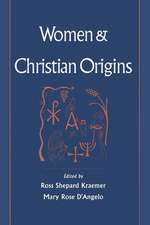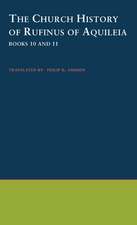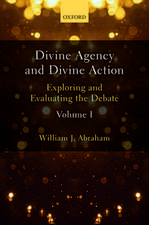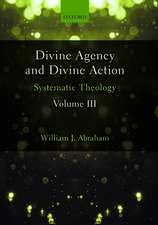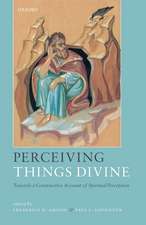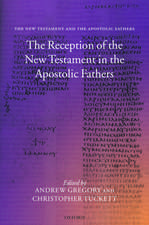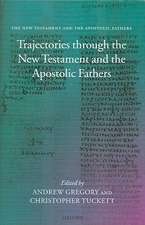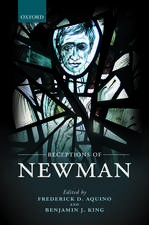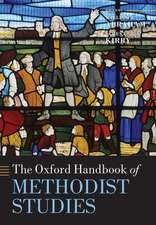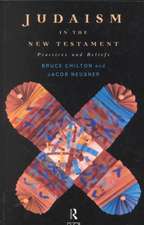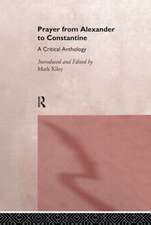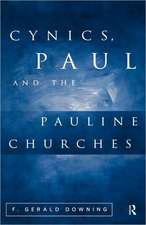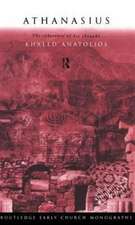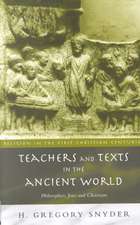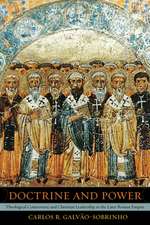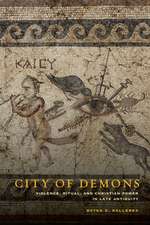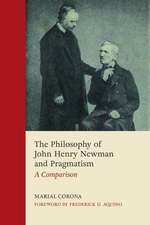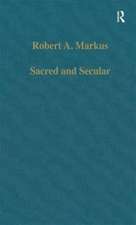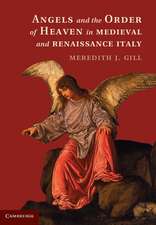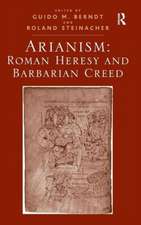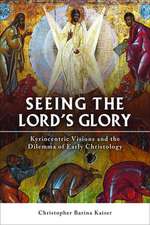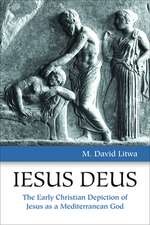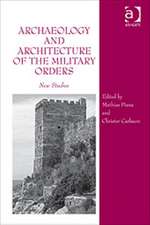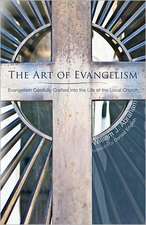The Oxford Handbook of the Epistemology of Theology: Oxford Handbooks
Editat de William J. Abraham, Frederick D. Aquinoen Limba Engleză Paperback – 9 noi 2021
| Toate formatele și edițiile | Preț | Express |
|---|---|---|
| Paperback (1) | 348.36 lei 10-17 zile | +116.10 lei 6-12 zile |
| OUP OXFORD – 9 noi 2021 | 348.36 lei 10-17 zile | +116.10 lei 6-12 zile |
| Hardback (1) | 860.64 lei 31-38 zile | |
| OUP OXFORD – 8 iun 2017 | 860.64 lei 31-38 zile |
Din seria Oxford Handbooks
-
 Preț: 236.89 lei
Preț: 236.89 lei - 8%
 Preț: 358.80 lei
Preț: 358.80 lei - 17%
 Preț: 912.51 lei
Preț: 912.51 lei - 12%
 Preț: 307.94 lei
Preț: 307.94 lei - 25%
 Preț: 829.05 lei
Preț: 829.05 lei - 14%
 Preț: 987.01 lei
Preț: 987.01 lei - 26%
 Preț: 1376.97 lei
Preț: 1376.97 lei - 29%
 Preț: 929.22 lei
Preț: 929.22 lei -
 Preț: 303.54 lei
Preț: 303.54 lei - 20%
 Preț: 343.85 lei
Preț: 343.85 lei - 14%
 Preț: 278.15 lei
Preț: 278.15 lei - 29%
 Preț: 930.94 lei
Preț: 930.94 lei - 30%
 Preț: 1065.79 lei
Preț: 1065.79 lei - 15%
 Preț: 357.85 lei
Preț: 357.85 lei -
 Preț: 263.45 lei
Preț: 263.45 lei - 23%
 Preț: 839.79 lei
Preț: 839.79 lei - 16%
 Preț: 264.39 lei
Preț: 264.39 lei - 33%
 Preț: 737.68 lei
Preț: 737.68 lei - 33%
 Preț: 725.45 lei
Preț: 725.45 lei - 26%
 Preț: 342.76 lei
Preț: 342.76 lei - 25%
 Preț: 366.95 lei
Preț: 366.95 lei - 13%
 Preț: 304.72 lei
Preț: 304.72 lei - 16%
 Preț: 263.35 lei
Preț: 263.35 lei - 12%
 Preț: 267.23 lei
Preț: 267.23 lei - 33%
 Preț: 815.51 lei
Preț: 815.51 lei - 13%
 Preț: 346.76 lei
Preț: 346.76 lei - 22%
 Preț: 1095.69 lei
Preț: 1095.69 lei - 29%
 Preț: 931.18 lei
Preț: 931.18 lei - 29%
 Preț: 942.77 lei
Preț: 942.77 lei - 24%
 Preț: 1071.82 lei
Preț: 1071.82 lei - 23%
 Preț: 1052.07 lei
Preț: 1052.07 lei - 21%
 Preț: 863.03 lei
Preț: 863.03 lei - 30%
 Preț: 815.25 lei
Preț: 815.25 lei - 29%
 Preț: 855.42 lei
Preț: 855.42 lei - 30%
 Preț: 842.04 lei
Preț: 842.04 lei - 11%
 Preț: 258.32 lei
Preț: 258.32 lei - 29%
 Preț: 859.51 lei
Preț: 859.51 lei - 29%
 Preț: 1083.61 lei
Preț: 1083.61 lei - 15%
 Preț: 273.41 lei
Preț: 273.41 lei - 30%
 Preț: 818.12 lei
Preț: 818.12 lei - 11%
 Preț: 365.23 lei
Preț: 365.23 lei - 21%
 Preț: 359.87 lei
Preț: 359.87 lei - 13%
 Preț: 264.87 lei
Preț: 264.87 lei - 9%
 Preț: 307.08 lei
Preț: 307.08 lei - 28%
 Preț: 845.79 lei
Preț: 845.79 lei - 23%
 Preț: 855.11 lei
Preț: 855.11 lei - 21%
 Preț: 861.04 lei
Preț: 861.04 lei - 12%
 Preț: 250.34 lei
Preț: 250.34 lei
Preț: 348.36 lei
Preț vechi: 415.62 lei
-16% Nou
Puncte Express: 523
Preț estimativ în valută:
66.66€ • 69.60$ • 55.17£
66.66€ • 69.60$ • 55.17£
Carte disponibilă
Livrare economică 03-10 martie
Livrare express 27 februarie-05 martie pentru 126.09 lei
Preluare comenzi: 021 569.72.76
Specificații
ISBN-13: 9780198816621
ISBN-10: 0198816626
Pagini: 656
Dimensiuni: 173 x 247 x 34 mm
Greutate: 1.13 kg
Editura: OUP OXFORD
Colecția OUP Oxford
Seria Oxford Handbooks
Locul publicării:Oxford, United Kingdom
ISBN-10: 0198816626
Pagini: 656
Dimensiuni: 173 x 247 x 34 mm
Greutate: 1.13 kg
Editura: OUP OXFORD
Colecția OUP Oxford
Seria Oxford Handbooks
Locul publicării:Oxford, United Kingdom
Recenzii
Combining the expertise of prominent scholars in the academic disciplines of philosophy, theology, and religious studies, the Handbook represents the most comprehensive qntematic exposition of the epistemology of theology arailable in the English language. ... It is difficult to find flaws in such meticulously executed work at both the systematic and historical level.
The volume would be very good for graduate students, seminarians, well-versed undergraduate religious studies majors, and clergy who seek to hone their scholarly skills. I recommend it for professors, like myself, who teach a course in the Writings, because it can provide not only good specific ideas for lectures but also an overall focus on the Writings.
we now have a text which ably introduces its audience of theologians, scriptural scholars, and philosophers to a broad class of epistemological concerns for theology. No one writing in analytic theology should remain wholly ignorant of its contents, which hail from many of the best epistemological and theological minds today ... the articles in this handbook balance high-level sophistication with accessibility ... We owe a great debt, then, to [the editors] for putting together such a fine work of scholarship and bringing the world of contemporary epistemology into serious conversation with contemporary theology.
The exceptional achievement of the book -- that it constitutes and indispensable bridge between Newman's epistemology and contemporary epistemic theories, which are hardly known within religious contexts.
This book is a remarkable and timely volume that is the result of the confluence of a number of important lines of inquiry in epistemology, philosophy of religion and theology . . . this text provides helpful standalone essays that can accompany units on standard issues within the theology curriculum . . . the constructive systematician will find in many of these essays valuable guidance regarding how to go about constructive work in a manner that is epistemically responsible . . . This volume excels as such a cardinal text and will be a required resource for any wishing to make a future contribution to theological topics that touch in any way on epistemic issues.
... an excellent example of world-class scholarship. The editors have assembled some of the best scholars in the fields of epistemology and theology respectively, and their essays are precise and praiseworthy for how they engage in quite arcane and rarified topics by making them accessible but not simplistic for their readers. The wide range of topics and figures discussed in the book, especially how many current issues in epistemology and theology are given voice and how they mutually inform one another are appreciated. Moreover, this work has set the standard for this new academic subdiscipline ... It is also neatly balanced with an almost equal number of chapters devoted to epistemology and theology respectively; therefore, should the reader be more inclined toward epistemology or theology or vice versa, they can settle into certain parts of the work before moving onto the other parts.
There is much in this book that merits attention. ... You do not need to be a philosopher to profit from this book. It taught me a lot.
Bridging theology and philosophy, The Oxford Handbook of the Epistemology of Theology is the ultimate source in this emerging field ... Destined to be an important reference and research tool, the volume examines ideas and people that have been crucial to the field but also introduces new ideas for scholars working in philosophical theology. This handbook sets the standard in this evolving field at the intersection of theology and epistemology.
This volume is substantial and well organized. It is comprehensive in its scope ... there is no question that this volume should be a central text in any course or discussion of theology and epistemology.
This volume will be an important addition to anyone interested in the given topic, both students and established scholars alike ... the volume should be an essential resource in the field for years to come.
The volume would be very good for graduate students, seminarians, well-versed undergraduate religious studies majors, and clergy who seek to hone their scholarly skills. I recommend it for professors, like myself, who teach a course in the Writings, because it can provide not only good specific ideas for lectures but also an overall focus on the Writings.
we now have a text which ably introduces its audience of theologians, scriptural scholars, and philosophers to a broad class of epistemological concerns for theology. No one writing in analytic theology should remain wholly ignorant of its contents, which hail from many of the best epistemological and theological minds today ... the articles in this handbook balance high-level sophistication with accessibility ... We owe a great debt, then, to [the editors] for putting together such a fine work of scholarship and bringing the world of contemporary epistemology into serious conversation with contemporary theology.
The exceptional achievement of the book -- that it constitutes and indispensable bridge between Newman's epistemology and contemporary epistemic theories, which are hardly known within religious contexts.
This book is a remarkable and timely volume that is the result of the confluence of a number of important lines of inquiry in epistemology, philosophy of religion and theology . . . this text provides helpful standalone essays that can accompany units on standard issues within the theology curriculum . . . the constructive systematician will find in many of these essays valuable guidance regarding how to go about constructive work in a manner that is epistemically responsible . . . This volume excels as such a cardinal text and will be a required resource for any wishing to make a future contribution to theological topics that touch in any way on epistemic issues.
... an excellent example of world-class scholarship. The editors have assembled some of the best scholars in the fields of epistemology and theology respectively, and their essays are precise and praiseworthy for how they engage in quite arcane and rarified topics by making them accessible but not simplistic for their readers. The wide range of topics and figures discussed in the book, especially how many current issues in epistemology and theology are given voice and how they mutually inform one another are appreciated. Moreover, this work has set the standard for this new academic subdiscipline ... It is also neatly balanced with an almost equal number of chapters devoted to epistemology and theology respectively; therefore, should the reader be more inclined toward epistemology or theology or vice versa, they can settle into certain parts of the work before moving onto the other parts.
There is much in this book that merits attention. ... You do not need to be a philosopher to profit from this book. It taught me a lot.
Bridging theology and philosophy, The Oxford Handbook of the Epistemology of Theology is the ultimate source in this emerging field ... Destined to be an important reference and research tool, the volume examines ideas and people that have been crucial to the field but also introduces new ideas for scholars working in philosophical theology. This handbook sets the standard in this evolving field at the intersection of theology and epistemology.
This volume is substantial and well organized. It is comprehensive in its scope ... there is no question that this volume should be a central text in any course or discussion of theology and epistemology.
This volume will be an important addition to anyone interested in the given topic, both students and established scholars alike ... the volume should be an essential resource in the field for years to come.
Notă biografică
William J. Abraham is Albert Cook Outler Professor of Wesley Studies at Southern Methodist University. His publications include Divine Revelation and the Limits of Historical Criticism (2000) and Canon and Criterion in Christian Theology (OUP, 1998).Frederick D. Aquino is Professor of Theology and Philosophy at the Graduate School of Theology, Abilene Christian University. He specializes in religious epistemology, the epistemology of theology, John Henry Newman, and Maximus the confessor. He is the co-editor of Receptions of Newman (OUP, 2015).
